
The Rise of AI Storytelling: Can Machines Write Good Fiction?
Article Level: C1-C2
Explanation: This article explores the potential of AI in storytelling, examining whether machines can create compelling fiction. It discusses AI’s limitations in capturing human emotion and complexity, while also highlighting its role as a tool for writers rather than a replacement.
Audio File of the Article
Read more: The Rise of AI Storytelling: Can Machines Write Good Fiction?

The Rise of AI Storytelling: Can Machines Write Good Fiction?
In recent years, the rise of artificial intelligence (AI) has transformed various industries, from healthcare to entertainment. One of the most intriguing developments is AI’s growing ability to generate creative content. AI storytelling, specifically in the realm of fiction writing, has stirred both excitement and concern among writers, readers, and industry experts alike. But can machines truly write compelling, human-like stories, or is this a step too far in the pursuit of technological advancement?
At its core, AI storytelling involves machine learning algorithms that can analyse vast amounts of text data to mimic patterns, structures, and language used in human-written stories. By training on a large dataset of books, articles, and other narrative forms, AI can generate text that seems, on the surface, to be coherent and engaging. Early experiments, such as OpenAI’s GPT models, have demonstrated the capability to produce fiction across genres, from science fiction to romance.
However, the question remains: Can AI truly craft good fiction? While AI can undoubtedly produce readable stories, the quality of its output often depends on how well the model has been trained and the depth of data it has access to. Unlike human writers, who draw from their own experiences, emotions, and understanding of the world, AI is limited to the patterns it has learned. It does not “feel” in the human sense and lacks the personal insight that often infuses literature with depth and meaning.
Moreover, while AI can mimic language patterns, it struggles with capturing the nuances of human emotion and psychological complexity that make stories resonate on a deeper level. For example, a machine might generate a plot full of action and dialogue, but it might fail to develop fully fleshed-out characters or produce meaningful conflict. These subtleties are what often elevate a simple narrative into something truly impactful, a feature that machines currently cannot replicate with the same level of authenticity.
That said, AI is not without its advantages. It can be an excellent tool for assisting writers in the creative process, providing inspiration or even drafting basic storylines that can later be refined. Additionally, AI can help overcome writer’s block or assist in creating stories at an unprecedented speed. For businesses and content creators, AI-generated fiction can be a cost-effective and efficient way to produce content, although it may lack the unique flair of a human author.
As technology continues to advance, AI will likely improve in its storytelling capabilities. However, it is doubtful that machines will replace the role of human writers anytime soon. While AI can support creativity, it remains a tool rather than a replacement. The beauty of fiction lies not just in the words on the page, but in the human experiences, emotions, and imagination that fuel them.

We’d love to hear your thoughts! Join the conversation by leaving a comment below. Sharing your insights, questions, or experiences can help you connect with others in our English learning community. It’s a great way to practice your English skills, engage with like-minded individuals, and improve together. Don’t be shy—jump in and let’s keep the discussion going!

 EnglishMasteryHub
EnglishMasteryHub